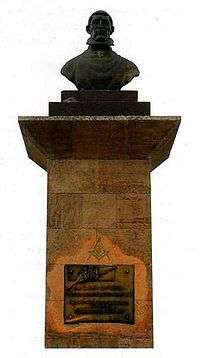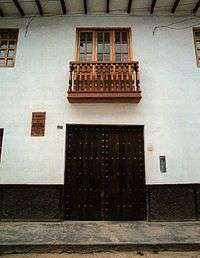Toribio Rodríguez de Mendoza

Toribio Rodríguez de Mendoza (1750–1825) was a Peruvian academic.
He was born on 15 April 1750 in Chachapoyas, his hometown, when José Antonio Manso de Velasco, count of Superunda, was governing the Viceroyalty of Peru. He was of the most illustrious precursors of the national independence. He was a priest, a professor and a tribune. He formed a new patriots' generation in the revolutionary ideas. When the Republic was born, the sower of renewing ideals was next to his disciples, sharing the responsibilities of the first Peruvian Constituent Congress.
During that time, Chachapoyas was a district of the Bishopric of Trujillo. In this city, which the main political and intellectual institutions of the region were centralized. Little Toribio, being still a child, was sent to this city, so he could go to the seminary.
There he studied Latin and prepared himself to continue ecclesiastic studies of more importance in the Seminar Santo Toribio de Lima (Saint Toribio of Lima Seminar). He entered in this seminar with outstanding notes.
He stands out as a brilliant student and in 1770 he obtains the degree of Doctor in Theology in the National University of San Marcos in Lima.
He dies in 1825 knowing that Peru is "free and independent because of the general will of its people".
The Professor

His interest in education run in his family. His parents, Santiago Rodríguez and Josefa Collantes, had a wealthy position and they were owners of a noble house in the main square of Chachapoyas. They had taken an active part in the efforts so that this city was provided with a school. Toribio should have felt impressed by this wish of his parents during his childhood, since he gave a lot of samples of his tendency to education from his early years.
Being still a student, he had begun working in the teaching field, revealing himself with a teacher's notable talent. His prestige as a professor had already grown when the viceroy Amat named him professor of the Real Convictorio de San Carlos in 1771. This convictorio was created to make up for the shortcoming that the expulsion of the Jesuits had left in education.
In this center he takes the chairs of philosophy and theology. It is here where his educator's personality is defined.
His talent opens him the doors of San Marcos, where they also deliver him a chair in 1773. During this time he ordained himself in four minor degrees and in 1778 he becomes a presbyter.
The Presbyter
He has to devote himself to the affairs of his ministry. Through a contest he wins the parish of Marcabal, an indigenous town placed in Huamachuco (La Libertad Region|La Libertad).
But the young priest is already incorporated into the intellectual elite of the epoch. A little time later, he is called again to Lima. He is entrusted with the vice-chancellor of the Convictorio Carolino and one year later, in 1786, the viceroy Teodoro de Croix makes him chancellor of this center of studies.
Till then, Rodríguez of Mendoza had been an eager and passionate reader of the philosophers whose thought was guided to Europe. And longing for introducing these advanced ideas in our environment, he carries out a spiritual, intellectual and material transformation. At the same time he re-build the building of the College, today University of San Marcos, he also puts into practice new education plans.
But it is not easy. Conservatives and reactionists stick blindly to the old systems. The professor is one of the first people that see the transformation that will bring the independence of Peru coming. That's why he wants to form a leading class that has an authentic Peruvian feeling.
The Tribune

He fights to impose the education in a common language, the study of natural sciences and to introduce professions that make the youth stand out in all the action fields. He supported the idea that it was necessary to give a profession to the young people who didn't want to choose the law court nor the altar.
Despite his consecration to form a leading class, he also worries about the popular education, trusting that the language unit would be the way to achieve the equality of the Indian with the Creole and White people.
In 1814, his disciples and friends found the Sociedad Filantrópica (Philanthropic Society) to spread the American revolution with clear anti-monarchist tendency.
But the enemies of the restructuring do not rest. The professor is already aged although it has not decreased the fire of the ideal in his spirit, that ideal that has been the north of his life. They make him the most ridiculous accusations. They call him volteriano, jansenista, luciferino, propagandist of prohibited ideas, etc.
His conduct was investigated in a more or less covered up way. The economic situation of the College was more precarious every day and in such circumstances, he resigned to be the academic chancellor in 1815, but Abascal did not accept his resignation. His resignation was accepted later in 1817 by Viceroy Pezuela.
At the arrival of the Expedición Libertadora (freedom expedition) of San Martin, his elder's illnesses did not prevent the old fighter to leave his retirement and to put himself to the orders of the liberating government. In this way he has the opportunity to take part in the birth of the Peruvian Republic as a member of the first Peruvian Constituent Congress.
In the assembly, he is a valuable and correct guide. Calm and serene, he sails with steadfastness between the passions turmoil that was unleashed by the independence.
But his health does not resist any more and he chooses to retire definitively. He lives enough to be glad for the victory of Ayacucho.
|